Emily Cullen's Blog, page 6
October 21, 2016
Free talk and reading on theme of revolutionary poetry at Galway City Museum tomorrow
Thank you to Brendan Mc Gowan and the team at the Galway Museum for inviting me to give a talk on the theme of 'revolutionary poetry' this Saturday, 22 October at 2pm. This is a free event and I'm delighted that Ndrek Gjini, a wonderful Galway-based Albanian poet, is able to join me to read from his poetry as part of this presentation, as well as speak on the subject of Communism in the Balkans, the poetry of Visar Zhiti and Vaclav Havel. I will be talking about Patrick Pearse, Thomas MacDonagh, Joseph Mary Plunkett, Anna Akhmatova, Osip Mandelstam, Pablo Neruda, Rafael Ziadahand contemporary Afghan women's poetry. Phew! It's a very broad topic and limitations of time mean that we won't be able to cover everyone but, sure, where would we be without a good challenge every now and then, eh? Come and join in the lively discussion, aimed for a general audience 15 years+. All welcome! Vive la revolution!
Here is the official promo piece about our talk from the Galway City Museum website:
Saturday, 22 October, 2pm – 4pm TALK & READINGS: Revolutionary Poetry
The 1916 Rising is often referred to as a ‘poet’s revolution’. Taking this as her starting point, poet Emily Cullen will introduce the work of international poets of revolution – historic and contemporary – including Anna Akhmatova, Vaclav Havel, Osip Mandelstam and Rafeef Ziadah. Galway-based Albanian poet Ndrek Gjini, who lived through the oppressive Enver Hoxha regime in the 1980s, will also read from his work. Age 15+ Anna Akhmatova (1889-1966)
Anna Akhmatova (1889-1966)
Here is the official promo piece about our talk from the Galway City Museum website:
Saturday, 22 October, 2pm – 4pm TALK & READINGS: Revolutionary Poetry
The 1916 Rising is often referred to as a ‘poet’s revolution’. Taking this as her starting point, poet Emily Cullen will introduce the work of international poets of revolution – historic and contemporary – including Anna Akhmatova, Vaclav Havel, Osip Mandelstam and Rafeef Ziadah. Galway-based Albanian poet Ndrek Gjini, who lived through the oppressive Enver Hoxha regime in the 1980s, will also read from his work. Age 15+
 Anna Akhmatova (1889-1966)
Anna Akhmatova (1889-1966)
Published on October 21, 2016 02:49
September 20, 2016
Just a few days left to register for 'Appreciation of Poetry' course
I'm really looking forward to getting my 'Appreciation of Poetry' course started in just over a fortnight, on Wednesday, 5 October. Themes will include: ways of understanding and reading a poem; how poetry is made; the sonnet; the villanelle and forms of rhyme; poetry in free verse; language and vision in ekphrasis; the haiku; image, nature and description; common things: poetry of the antipoetic and spoken word. We'll explore the work of the poets below as well as RS Thomas, Wendy Cope, Patrick Kavanagh, Lucille Clifton, Sylvia Plath & Bronwyn Lea. Only 10 days left to register! Contact berna.morgan@nuigalway.ie for further information and see page 10 of the Short Courses booklet: http://www.nuigalway.ie/…/fil…/Short-Courses-Series-2016.pdf See also my last post with full details.
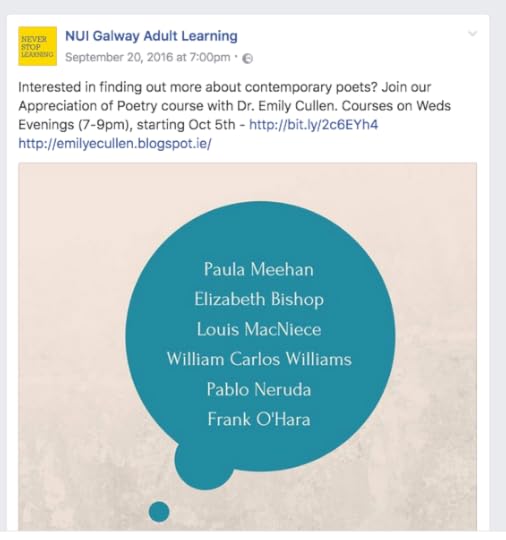
Published on September 20, 2016 12:29
September 10, 2016
Appreciation of Poetry: New short evening course at NUI Galway
I’m delighted to announce details of the short evening course I will be teaching for Adult Education, NUI Galway in the Autumn. ‘Appreciation of Poetry’ will be an eight week course exploring how great modernist and contemporary poetry mediates the world. In a fun, informal environment, we will read from the Imagists at the start of the twentieth century right up to contemporary poetry by way of an exploration of language, voice, genre, form, theme and metaphor. Some of the Irish and international writers we will look at include: Louis MacNiece, William Carlos Williams, Pablo Neruda, Frank O’Hara, Elizabeth Bishop, Lucille Clifton, Paula Meehan and Sharon Olds. As a widely published, and practising poet, this subject is truly close to my heart and it promises to be an exciting voyage through some great poetry of the 20th and 21st centuries. What better way to spend the dark nights between October and December! All you need to bring with you is a curiosity about poetry and an interest in the pleasures and possibilities of language - no prior knowledge is assumed and I will tailor the course to the particular needs of the group. Details of the course are below. Please spread the word to anyone whom you think may be interested. Thanks
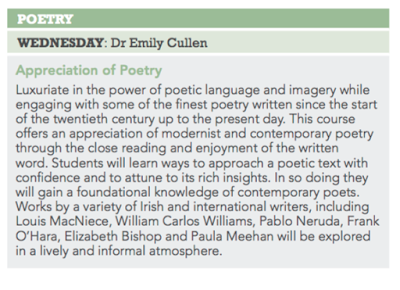

You can register by post by completing the application form at the end of the brochure and returning it together with payment to:
Ms. Berna Morgan
Short Courses Series 2016 Centre for Adult Learning & Professional Development NUI Galway
You can read more in the NUI Galway Adult Education Short Course brochure.
What critics have said about my recent collection of poetry, In Between Angels and Animals (Arlen House, 2013):
Her poetic style is lyrical, intelligent and confident and the poems are searching in a sophisticated and detached way....She goes on to explore many subjects: love, exile, technology, all in a worldwide context…The poetry is erudite and far-reaching and, as the title suggests, it touches on the whole created universe, as the Elziabethans understood it! – Poetry Ireland Review, Issue 115, April 2015
She uses her words wisely and sparingly, with none wasted as emotions, images and thoughts are conjured up. - Books Ireland, March/April 2014
I recommend this collection wholeheartedly to all those interested in Irish writing in Irish and in English. - The Australasian Journal of Irish Studies, Vol. 13, 2013
Published on September 10, 2016 05:39
August 25, 2016
Fourth Annual Féile na bhFlaitheartach to take place on Inis Mór this weekend
As an admirer of Liam O'Flaherty's writings and as a committee member of the Liam and Tom O'Flaherty Society, I am delighted to announce that the fourth Féile na bhFlaitheartach takes place on Inis Mór this weekend. See below for the full programme and please consider joining us for another memorable weekend of readings, music, drama, good chat, craic and debate. Note that the ferry departs at 10:30am each morning.
I've been sharing information and articles about the Féile over the past few weeks on other social media and hope to write a future blog post about O'Flaherty's writings. If you haven't already done so, this is the year to read his novel, Insurrection , which was first published in 1950. This gripping work of fiction focuses on Connemara man, Bartly Madden, who returns from England to Dublin at the outset of Easter Week 1916 and gradually finds himself caught up in the Rising.
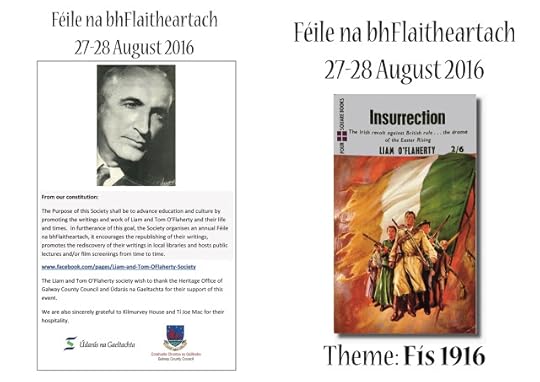
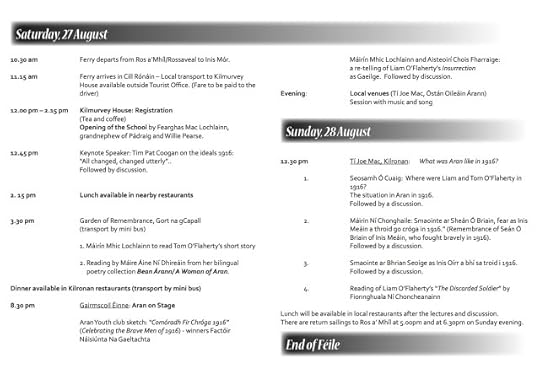 Rossaveal at 10:30am.
Rossaveal at 10:30am.
Published on August 25, 2016 03:48
June 29, 2016
Coming soon….Featured Writer of the Month
Starting in September I will be inviting one writer to do a short interview with me each month about their writing practice and current projects. I’m delighted to announce that the inaugural author to feature will be Galway-based poet, short story, and young adult fiction writer, Geraldine Mills. Geraldine recently completed Gold, published by Little Island, and we will be chatting about the inspiration behind the book as well as plenty of other things. So watch this space.
In the meantime, there are some excellent writers reading their work at Over the Edge tomorrow night including Niamh Boyce, William Wall, Susan Millar DuMars and Paul Duffy (Over the Edge New Writer of the Year, 2015). Get along to The Kitchen at The Museum at 8pm for an unmissable event!
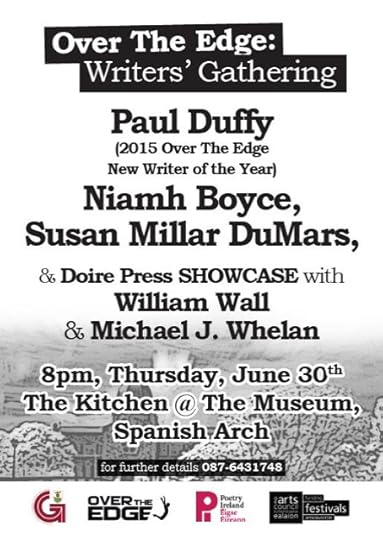
Published on June 29, 2016 04:06
March 16, 2016
Paying my respects to Anita Brookner - a truly gifted author
I’ve always enjoyed reading about female outsiders on the periphery of society, often set apart by the impulse to question. The novels of Anita Brookner and Jean Rhys formed a considerable backdrop to the world of my twenties so I was shocked and saddened to learn yesterday, on Facebook, of the death of one of my all-time favourite writers: Anita Brookner. She passed away last week on 10 March and, as the mother of a seven-week old infant, I admit I am slightly out-of-touch these days, so I was late in learning the news.
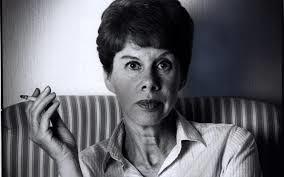 Anita Brookner (1928-2016)
Anita Brookner (1928-2016)
My first introduction to Brookner’s universe occurred during my teens, in the town library of Carrick-on-Shannon, where I grew up. I chanced upon Providence (1982) on a shelf, opened a random page and was instantly hooked. Some years later, in 1996, I wrote my MA thesis on Brookner at NUI Galway (then UCG), focusing on Romanticism and Existentialism in her novels and refuting claims, mostly made by male critics, that she wrote ‘romantic novels’ (Bayles dismissed Hotel du Lac(1993) as ‘Harlequin Romance for Highbrows’). Anita Brookner never complied with the conventions of the popular romance, such as fantasy resolution through fusion and marriage. I believe her work is intimately involved, however, with the modes of Romanticism which is characterized, instead, by fragmentation, and also with Existentialism, where separateness and alienation are central to her ‘poetics of loss’. In fact, a typical Brookner ending, with its raised expectations and ironic reversal, approximates more towards ‘anti-romance’. Many of her heroines are prompted, by the stark anti-romanticism of their realities, to re-evaluate expectations of people and the world around them. Often, they may start out looking to literary paradigms to answer their questions about life, then they gradually arrive at new insights about themselves and their environments. So, while 'happy endings' are scarce in her work, Brookner’s protagonists often move beyond delusion to a greater understanding; they are empowered to strive for authenticity in their lives.
Throughout her career, Brookner has been unflinchingly courageous in tackling tricky subjects without whitewashing the grittiness. She herself once wrote in the Times Literary Supplement ‘…there is a truth even more terrible than [we] suppose and it was discovered by certain members of the Romantic generation. The truth is this: reason does not work any better than myth.” Her novels are interested in subjectivity as it is constituted socially, culturally and psychologically. They offer us worlds where diverse themes are explored, such as family relationships, female friendships, bonds between men and women, power struggles, bonds of religion and bonds between life and the aesthetic realm. A joy to read on a linguistic level, as they are so elegantly crafted, they are also refreshingly honest; she does not shirk from the big themes of love, sex, isolation and loneliness, gender, ageing, myth vs ‘reality’ in an absurd universe. Brookner’s hesitancy to inscribe redemption can be taken as a counter-statement – one which exposes the repressive effects of romantic myth in Western culture and highlights how it can so easily worm its way into our lives. In an interview for The Paris Review in 1987 the novelist herself stated: “The true Romantic novel is about delayed happiness, and the pilgrimage you go through to reach that happiness.”
It is some years now since I read her work but, at one point, shortly after I wrote my thesis I was reading her constantly. Then, somewhere along my reading journey, I decided to take a break from her somewhat bleak, yet honest, worldvision and, in particular, from the too neat binary recognizable in some of her female characters: charismatic glamourpuss ('winner') is pitted against the introverted book worm ('loser'). This was one of the very few tics in her corpus that cloyed for me. The rest of the journey was magical and I drank in her prose and stylish syntactical choices, as well as the candour of her psychological insight. For my money, Hotel du Lac was over-hyped and some of her later novels surpassed it, but it has certainly become a deserved classic, and the Booker prize it garnered in 1984 was a rare moment during her long, prolific career, where critics shone a light upon her outstanding talent.
Thinking back to the many quiet moments of reading pleasure she afforded me also carries fond memories of a more carefree time in my life as a postgraduate student in the first flush of love with an ERASMUS exchange student from Belgium. So her passing has opened up more than literary reminiscences and also evoked a happy phase of research, enquiry and personal joy at a formative time in my life. There is much more that could be said about her oeuvre but limitations of time (see reference to new infant above!) and space demand that I keep this post brief and hope to continue the discussion another day. Anita Brookner did not believe in an absolute and, apparently, she chose not to have a funeral. Wherever she is, her literary legacy and the recollection of encountering and relishing her work will continue to occupy a unique place in my heart and mind.
 Anita Brookner (1928-2016)
Anita Brookner (1928-2016)My first introduction to Brookner’s universe occurred during my teens, in the town library of Carrick-on-Shannon, where I grew up. I chanced upon Providence (1982) on a shelf, opened a random page and was instantly hooked. Some years later, in 1996, I wrote my MA thesis on Brookner at NUI Galway (then UCG), focusing on Romanticism and Existentialism in her novels and refuting claims, mostly made by male critics, that she wrote ‘romantic novels’ (Bayles dismissed Hotel du Lac(1993) as ‘Harlequin Romance for Highbrows’). Anita Brookner never complied with the conventions of the popular romance, such as fantasy resolution through fusion and marriage. I believe her work is intimately involved, however, with the modes of Romanticism which is characterized, instead, by fragmentation, and also with Existentialism, where separateness and alienation are central to her ‘poetics of loss’. In fact, a typical Brookner ending, with its raised expectations and ironic reversal, approximates more towards ‘anti-romance’. Many of her heroines are prompted, by the stark anti-romanticism of their realities, to re-evaluate expectations of people and the world around them. Often, they may start out looking to literary paradigms to answer their questions about life, then they gradually arrive at new insights about themselves and their environments. So, while 'happy endings' are scarce in her work, Brookner’s protagonists often move beyond delusion to a greater understanding; they are empowered to strive for authenticity in their lives.
Throughout her career, Brookner has been unflinchingly courageous in tackling tricky subjects without whitewashing the grittiness. She herself once wrote in the Times Literary Supplement ‘…there is a truth even more terrible than [we] suppose and it was discovered by certain members of the Romantic generation. The truth is this: reason does not work any better than myth.” Her novels are interested in subjectivity as it is constituted socially, culturally and psychologically. They offer us worlds where diverse themes are explored, such as family relationships, female friendships, bonds between men and women, power struggles, bonds of religion and bonds between life and the aesthetic realm. A joy to read on a linguistic level, as they are so elegantly crafted, they are also refreshingly honest; she does not shirk from the big themes of love, sex, isolation and loneliness, gender, ageing, myth vs ‘reality’ in an absurd universe. Brookner’s hesitancy to inscribe redemption can be taken as a counter-statement – one which exposes the repressive effects of romantic myth in Western culture and highlights how it can so easily worm its way into our lives. In an interview for The Paris Review in 1987 the novelist herself stated: “The true Romantic novel is about delayed happiness, and the pilgrimage you go through to reach that happiness.”
It is some years now since I read her work but, at one point, shortly after I wrote my thesis I was reading her constantly. Then, somewhere along my reading journey, I decided to take a break from her somewhat bleak, yet honest, worldvision and, in particular, from the too neat binary recognizable in some of her female characters: charismatic glamourpuss ('winner') is pitted against the introverted book worm ('loser'). This was one of the very few tics in her corpus that cloyed for me. The rest of the journey was magical and I drank in her prose and stylish syntactical choices, as well as the candour of her psychological insight. For my money, Hotel du Lac was over-hyped and some of her later novels surpassed it, but it has certainly become a deserved classic, and the Booker prize it garnered in 1984 was a rare moment during her long, prolific career, where critics shone a light upon her outstanding talent.
Thinking back to the many quiet moments of reading pleasure she afforded me also carries fond memories of a more carefree time in my life as a postgraduate student in the first flush of love with an ERASMUS exchange student from Belgium. So her passing has opened up more than literary reminiscences and also evoked a happy phase of research, enquiry and personal joy at a formative time in my life. There is much more that could be said about her oeuvre but limitations of time (see reference to new infant above!) and space demand that I keep this post brief and hope to continue the discussion another day. Anita Brookner did not believe in an absolute and, apparently, she chose not to have a funeral. Wherever she is, her literary legacy and the recollection of encountering and relishing her work will continue to occupy a unique place in my heart and mind.
Published on March 16, 2016 11:47
March 15, 2016
Happy Proclamation Day!
As part of the commemorative events for the one hundredth anniversary of the 1916 Rising today has been declared Proclamation Day or Lá Fhoróga na Saoirse. The delivery, by the Defence Forces, of the Irish flag and a copy of the Proclamation of the Irish Republic to all national schools in the country this year is a tangible and potent reminder of the indelible link between the Easter Rising and the Irish tricolour. Today the national flag is being hoisted on flagpoles at schools and institutions around the country and the Proclamation is being recited.
In spite of all the furore and divided opinion about the way the Centenary of the Rising is being celebrated, I believe this simple initiative is laudable and means that younger generations will understand the historical context and broader implications of the 1916 insurrection. It is refreshing that we are able to move beyond the taciturnity that earlier generations of Irish people upheld around Irish patriotism and the fight for freedom, mainly for fear of being labelled a sympathiser of violent Republicanism.
Earlier this morning I attended a special ceremony at my son's school to mark the occasion and was moved to hear the children of sixth class reciting Patrick Pearse's poems, 'The Wayfarer', 'The Mother' and reading the Proclamation in Irish. They also sang Irish songs such as 'Oro se do breath bhaile' and Thomas Davis' 'A Nation Once Again' and the school hall was decked with projects about the key figures in the Rising.
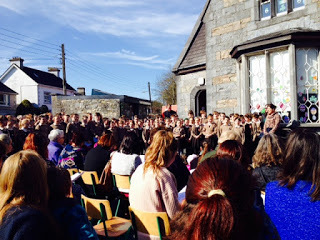
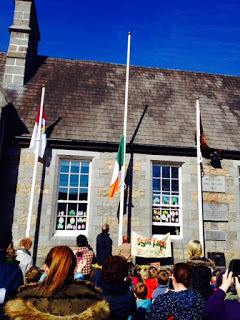
Lets hope the values of cherishing equally all Irish women and Irish men, inscribed in the Proclamation, will be fully realised and marginalised groups such as Travellers won't have to endure continued social and legislative exclusion.
To read the full programme of national events marking the Centenary click here
The WayfarerThe beauty of the world hath made me sad,
This beauty that will pass;
Sometimes my heart hath shaken with great joy
To see a leaping squirrel in a tree,
Or a red lady-bird upon a stalk,
Or little rabbits in a field at evening,
Lit by a slanting sun,
Or some green hill where shadows drifted by
Some quiet hill where mountainy man hath sown
And soon would reap; near to the gate of Heaven;
Or children with bare feet upon the sands
Of some ebbed sea, or playing on the streets
Of little towns in Connacht,
Things young and happy.
And then my heart hath told me:
These will pass,
Will pass and change, will die and be no more,
Things bright and green, things young and happy;
And I have gone upon my way
Sorrowful.
Patrick Pearse
The MotherI do not grudge them: Lord, I do not grudge
My two strong sons that I have seen go out
To break their strength and die, they and a few,
In bloody protest for a glorious thing,
They shall be spoken of among their people,
The generations shall remember them,
And call them blessed;
But I will speak their names to my own heart
In the long nights;
The little names that were familiar once
Round my dead hearth.
Lord, thou art hard on mothers:
We suffer in their coming and their going;
And tho' I grudge them not, I weary, weary
Of the long sorrow - And yet I have my joy:
My sons were faithful, and they fought.
Patrick Pearse
In spite of all the furore and divided opinion about the way the Centenary of the Rising is being celebrated, I believe this simple initiative is laudable and means that younger generations will understand the historical context and broader implications of the 1916 insurrection. It is refreshing that we are able to move beyond the taciturnity that earlier generations of Irish people upheld around Irish patriotism and the fight for freedom, mainly for fear of being labelled a sympathiser of violent Republicanism.
Earlier this morning I attended a special ceremony at my son's school to mark the occasion and was moved to hear the children of sixth class reciting Patrick Pearse's poems, 'The Wayfarer', 'The Mother' and reading the Proclamation in Irish. They also sang Irish songs such as 'Oro se do breath bhaile' and Thomas Davis' 'A Nation Once Again' and the school hall was decked with projects about the key figures in the Rising.


Lets hope the values of cherishing equally all Irish women and Irish men, inscribed in the Proclamation, will be fully realised and marginalised groups such as Travellers won't have to endure continued social and legislative exclusion.
To read the full programme of national events marking the Centenary click here
The WayfarerThe beauty of the world hath made me sad,
This beauty that will pass;
Sometimes my heart hath shaken with great joy
To see a leaping squirrel in a tree,
Or a red lady-bird upon a stalk,
Or little rabbits in a field at evening,
Lit by a slanting sun,
Or some green hill where shadows drifted by
Some quiet hill where mountainy man hath sown
And soon would reap; near to the gate of Heaven;
Or children with bare feet upon the sands
Of some ebbed sea, or playing on the streets
Of little towns in Connacht,
Things young and happy.
And then my heart hath told me:
These will pass,
Will pass and change, will die and be no more,
Things bright and green, things young and happy;
And I have gone upon my way
Sorrowful.
Patrick Pearse
The MotherI do not grudge them: Lord, I do not grudge
My two strong sons that I have seen go out
To break their strength and die, they and a few,
In bloody protest for a glorious thing,
They shall be spoken of among their people,
The generations shall remember them,
And call them blessed;
But I will speak their names to my own heart
In the long nights;
The little names that were familiar once
Round my dead hearth.
Lord, thou art hard on mothers:
We suffer in their coming and their going;
And tho' I grudge them not, I weary, weary
Of the long sorrow - And yet I have my joy:
My sons were faithful, and they fought.
Patrick Pearse
Published on March 15, 2016 08:00
March 8, 2016
A poem for International Women's Day
A light-hearted poem from my second collection, IN BETWEEN ANGELS AND ANIMALS, on International Womens Day
JOWLWhat shall I do with this body they gave me,so much my own, so intimate with me? – Osip Mandelstam
Your lipstick meanders outside the line of your thinning lips.You leave the house in your current state,abandon your eyeliner flick;your come-to-bed eyesnever-got-to-bed eyes.
Everyone knows a woman must maintain her youthful good looks.
‘Muscle has memory’, you tell yourself,panting on the treadmill,willing your thighs to rememberthey were flagrantly slimmer.Are you two dress sizesfrom happiness?At least you feel no pressureto schedule a vajazzle.
Everyone knows a woman must maintain her youthful good looks.
You blend foundation into sagging contours of your face,wondering when exactly your pores became craters.Blusher is your best friendnow you’re blanched like abunch of asparagus spears.
Everyone knows a woman must maintain her youthful good looks.
Will you ever reclaim that alchemywhen your dress expressed you perfectly?Your jokes were funnier, your hair glossier:your tresses billowed – now they’re flyaway.You moved with élan on the dancefloor,trod lightly, didn’t spill gravy.
Everyone knows a woman must maintain her youthful good looks.
You will grow old gracefullyexcept grace is a myth;the world ignores womenwho slide into invisibility.They already start to cut you off,in pre-emptive glances at a watch.So pop open the serum and primer, remember to drink ten gallons of water,learn how to be soignéeor choose opacity.
Because everyone knows a woman must maintain her youthful good looks.
You who were always diffidentabout the male gaze,who never suspected those catcalls were directed at you, can enjoykeeping your thoughts intact;no worries about being leered at,nurture what is hidden,focus on seeing anew.
Screw you.
© Emily Cullen
 'Girl in Mirror', Roy Lichtenstein, 1964
'Girl in Mirror', Roy Lichtenstein, 1964
JOWLWhat shall I do with this body they gave me,so much my own, so intimate with me? – Osip Mandelstam
Your lipstick meanders outside the line of your thinning lips.You leave the house in your current state,abandon your eyeliner flick;your come-to-bed eyesnever-got-to-bed eyes.
Everyone knows a woman must maintain her youthful good looks.
‘Muscle has memory’, you tell yourself,panting on the treadmill,willing your thighs to rememberthey were flagrantly slimmer.Are you two dress sizesfrom happiness?At least you feel no pressureto schedule a vajazzle.
Everyone knows a woman must maintain her youthful good looks.
You blend foundation into sagging contours of your face,wondering when exactly your pores became craters.Blusher is your best friendnow you’re blanched like abunch of asparagus spears.
Everyone knows a woman must maintain her youthful good looks.
Will you ever reclaim that alchemywhen your dress expressed you perfectly?Your jokes were funnier, your hair glossier:your tresses billowed – now they’re flyaway.You moved with élan on the dancefloor,trod lightly, didn’t spill gravy.
Everyone knows a woman must maintain her youthful good looks.
You will grow old gracefullyexcept grace is a myth;the world ignores womenwho slide into invisibility.They already start to cut you off,in pre-emptive glances at a watch.So pop open the serum and primer, remember to drink ten gallons of water,learn how to be soignéeor choose opacity.
Because everyone knows a woman must maintain her youthful good looks.
You who were always diffidentabout the male gaze,who never suspected those catcalls were directed at you, can enjoykeeping your thoughts intact;no worries about being leered at,nurture what is hidden,focus on seeing anew.
Screw you.
© Emily Cullen
 'Girl in Mirror', Roy Lichtenstein, 1964
'Girl in Mirror', Roy Lichtenstein, 1964
Published on March 08, 2016 08:00
March 6, 2016
On poet RS Thomas
One of my favourite columnists, the writer known as Barnaby ffrench, contributes an article to The Galway Advertiser each week, which elevates this free local, commercial paper to glorious heights. (Incidentally, the paper boasts some other wonderful journalists and includes fascinating articles on local and national history, etc). This week, in his ‘Through the Glass Darkly’ column, ffrench turned his attention to one of my favourite poets, the Welshman RS Thomas. One of the first poems I read by Thomas was ‘Sick Visits’. This poem literally stopped me in my tracks with its arresting imagery and the peculiar language the poet uses to describe his visits, as an Anglican parson, to the infirm, elderly women of his parish.
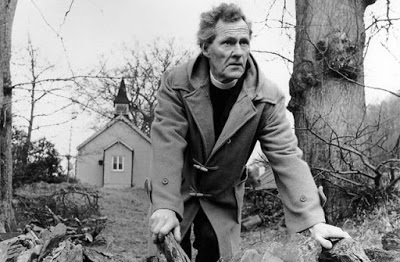 Poet, RS Thomas (1913-2000)
Poet, RS Thomas (1913-2000)
Sick Visits
They keep me sober,The old ladiesStiff in their beds,Mostly with pale eyesWintering me.Some are like blonde dolls,Their joints twisted;Life in its brief playWas a bit rough.Some fumbleWith thick tongue for wordsAnd are deaf;Shouting their faint namesI listen:They are far off,The echoes return slow.
But without them,Without the subdued lightTheir smiles kindle,I would have gone wild,Drinking earth’s huge draughts
Of joy and woe.
RS Thomas
The artistic detachment required for the poet to manifest such stark, compelling phrases as ‘blonde dolls’ is offset by his attentive kindness to the women he describes. If, as the Russian formalists have argued, literature and art is created when ‘the familiar’ is defamiliarised’ in artful ways, then Thomas’s oeuvre is surely a case in point; his work transfigures the mundane with its startling imagery. The force of the poet’s humanity is powerfully felt in the last stanza where he discloses his debt to these women with gracious humility. Sometimes the 'subdued' illumination we need is kindled by unexpected sources. The poem demonstrates how we can reframe the world around us and make the best of every situation by looking with eyes of love and harnessing the transformative power of the imagination. It calls to mind Patrick Kavanagh’s ‘The Hospital’ in which the speaker ‘falls in love with the functional ward / Of a chest hospital’. On a linguistic level, I am struck by the syntactical skill of the opening lines where Thomas could have written ‘The old ladies / keep me sober’ but chose a more indirect approach instead, yielding a stronger impact and drawing the reader in. This deliberate ordering of words is reminiscent of W.H. Auden’s opening lines in his ‘Musée des Beaux Arts’: ‘About suffering they were never wrong, / the Old Masters’ (which is included in an earlier post on this blog). The vision of the old ladies ‘Wintering’ the poet is also quietly potent.
 Poet, RS Thomas (1913-2000)
Poet, RS Thomas (1913-2000)Sick Visits
They keep me sober,The old ladiesStiff in their beds,Mostly with pale eyesWintering me.Some are like blonde dolls,Their joints twisted;Life in its brief playWas a bit rough.Some fumbleWith thick tongue for wordsAnd are deaf;Shouting their faint namesI listen:They are far off,The echoes return slow.
But without them,Without the subdued lightTheir smiles kindle,I would have gone wild,Drinking earth’s huge draughts
Of joy and woe.
RS Thomas
The artistic detachment required for the poet to manifest such stark, compelling phrases as ‘blonde dolls’ is offset by his attentive kindness to the women he describes. If, as the Russian formalists have argued, literature and art is created when ‘the familiar’ is defamiliarised’ in artful ways, then Thomas’s oeuvre is surely a case in point; his work transfigures the mundane with its startling imagery. The force of the poet’s humanity is powerfully felt in the last stanza where he discloses his debt to these women with gracious humility. Sometimes the 'subdued' illumination we need is kindled by unexpected sources. The poem demonstrates how we can reframe the world around us and make the best of every situation by looking with eyes of love and harnessing the transformative power of the imagination. It calls to mind Patrick Kavanagh’s ‘The Hospital’ in which the speaker ‘falls in love with the functional ward / Of a chest hospital’. On a linguistic level, I am struck by the syntactical skill of the opening lines where Thomas could have written ‘The old ladies / keep me sober’ but chose a more indirect approach instead, yielding a stronger impact and drawing the reader in. This deliberate ordering of words is reminiscent of W.H. Auden’s opening lines in his ‘Musée des Beaux Arts’: ‘About suffering they were never wrong, / the Old Masters’ (which is included in an earlier post on this blog). The vision of the old ladies ‘Wintering’ the poet is also quietly potent.
Published on March 06, 2016 14:35
February 20, 2016
A chat with Niamh Boyce about poetry, motherhood, truth
I'm delighted and honoured to be interviewed by award-winning novelist and author of The Herbalist, Niamh Boyce on her blog. We had a fun and diverse chat about writing, motherhood, truth in poetry and imagining Yeats with leaking breast pads! Thank you Niamh! You can read our discussion here
Published on February 20, 2016 06:13



